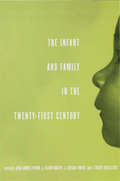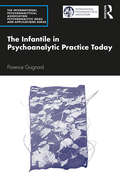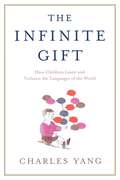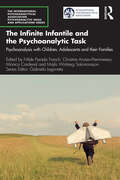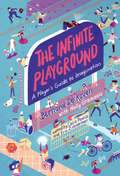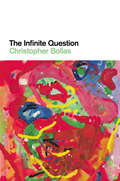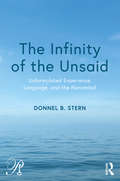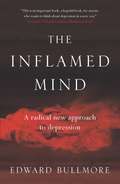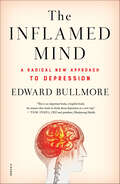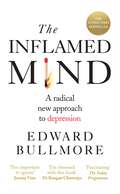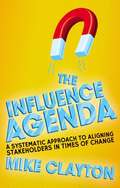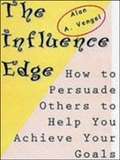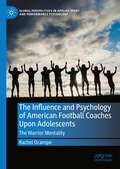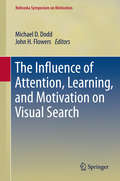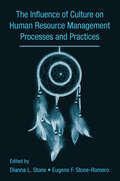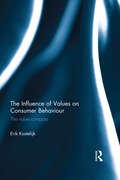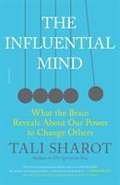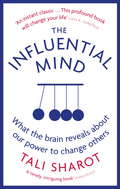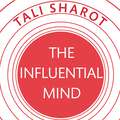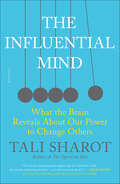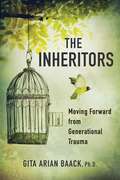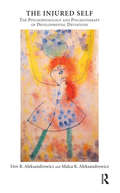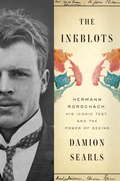- Table View
- List View
The Infant and Family in the Twenty-First Century (The Mentor Series (IACAPAP))
by T. Berry Brazelton J. Kevin Nugent João Gomes-Pedro J. Gerald YoungFirst Published in 2003. Routledge is an imprint of Taylor & Francis, an informa company.
The Infantile in Psychoanalytic Practice Today (The International Psychoanalytical Association Psychoanalytic Ideas and Applications Series)
by Florence GuignardThe Infantile in Psychoanalytic Practice Today demonstrates the concept of the Infantile, first proposed almost a quarter of a century ago, and the ways in which it has become an indispensable tool in contemporary psychoanalytic clinical practice. As a “concept of the third type”, the Infantile makes the “links-between-the-links” woven into the transference/countertransference functional and effective with patients of all ages, and is related to the double helix between infant neurosis and transference neurosis as revealed by Freud. The author proposes the Infantile as a key concept in the psychic organization of every human being, as the unconscious internal space that includes both the repressed elements of the past and the constantly renewed expressions of the drives. As a unique and dynamic configuration for each person, the book explores the way this relates to others, to the environment, and also to the individual’s own psychic contents and movements. This eagerly awaited English edition includes two new chapters, filling a gap in the psychoanalytic library. As a concept with international scope, these writings on the Infantile will be essential reading for psychoanalysts working today and all those interested in the history of psychoanalysis.
The Infant’s World (The Developing Child #39)
by Philippe RochatWhat do infants know? What do they feel, and how do they come to understand what’s happening around them? How do they begin to construe others as persons with feelings and intentions? These questions inspire this remarkable new look at the infant’s world. The short answer? Infants are much more sophisticated perceivers, feelers, and thinkers of their world than we may think. In this lively book, Philippe Rochat makes a case for an ecological approach to human development. Looking at the ecological niche infants occupy, he describes how infants develop capabilities and conceptual understanding in relation to three interconnected domains: the self, objects, and other people. Drawing on the great body of contemporary “competent infant” research, Rochat offers a thoughtful overview of many current, controversial topics, from neonatal imitation to early numeracy, to the development of self-awareness. In a provocative conclusion, he describes infancy as a series of key transitions—so dramatic that they are sometimes called “revolutions”—and maps out the processes that impel development. Offering a unifying theoretical vision of the vast research of recent years, The Infant’s World is an inspiring introduction to the liveliest area of modern psychology.
The Infinite Gift: How Children Learn and Unlearn the Languages of the World
by Charles YangA child's very first word is a miraculous sound, the opening note in a lifelong symphony. Most parents never forget the moment. But that first word is soon followed by a second and a third, and by the age of three, children are typically learning ten new words every day and speaking in complete sentences. The process seems effortless, and for children, it is. But how exactly does it happen? How do children learn language? And why is it so much harder to do later in life?Drawing on cutting-edge developments in biology, neurology, psychology, and linguistics, Charles Yang's The Infinite Gift takes us inside the astonishingly complex but largely subconscious process by which children learn to talk and to understand the spoken word. Yang illuminates the rich mysteries of language: why French newborns already prefer the sound of French to English; why baby-talk, though often unintelligible, makes perfect linguistic sense; why babies born deaf still babble -- but with their hands; why the grammars of some languages may be evolutionarily stronger than others; and why one of the brain's earliest achievements may in fact be its most complex. Yang also puts forth an exciting new theory. Building on Noam Chomsky's notion of a universal grammar -- the idea that every human being is born with an intuitive grasp of grammar -- Yang argues that we learn our native languages in part by unlearning the grammars of all the rest. This means that the next time you hear a child make a grammatical mistake, it may not be a mistake at all; his or her grammar may be perfectly correct in Chinese or Navajo or ancient Greek. This is the brain's way of testing its options as it searches for the local and thus correct grammar -- and then discards all the wrong ones. And we humans, Yang shows, are not the only creatures who learn this way. In fact, learning by unlearning may be an ancient evolutionary mechanism that runs throughout the animal kingdom. Thus, babies learn to talk in much the same way that birds learn to sing. Enlivened by Yang's experiences with his own young son, The Infinite Gift is as charming as it is challenging, as thoughtful as it is thought-provoking. An absorbing read for parents, educators, and anyone who has ever wondered about the origins of that uniquely human gift: our ability to speak and, just as miraculous, to understand one another.
The Infinite Infantile and the Psychoanalytic Task: Psychoanalysis with Children, Adolescents and their Families (The International Psychoanalytical Association Psychoanalytic Ideas and Applications Series)
by Christine Anzieu-Premmereur Nilde Parada Franch Mónica Cardenal Majlis Winberg SalomonssonThe Infinite Infantile and the Psychoanalytic Task is a fascinating collection of essays that proposes to restore and elaborate original conceptions of the complexity of mental processes in the early years of life until the onset of adolescence, and from then until adulthood.This book, led by the Committee on Child and Adolescent Psychoanalysis (COCAP) of the International Psychoanalytical Association (IPA), commits to shedding light on new developments in theory and practice in this area. Each chapter offers an expression of current thinking and clinical work with child and adolescent patients, as well as with their parents, families, and community. The complex contributions by brilliant and erudite scholars offer a fresh take on the existing body of thought on infancy and childhood in psychoanalysis that will challenge and enlighten readers of all backgrounds. Within these perspectives, the development of internal and external bonds is the focus, as well as a consideration of how analysts work in their time with young patients at these key moments of the life cycle.With their expertise in childhood, the contributors share complex views on the link between analysis with young children and psychoanalysis with adults, making it an essential read for child and adolescent psychoanalysts in practice and in training.
The Infinite Playground: A Player's Guide to Imagination
by Bernard De KovenIn his final work, a visionary game designer reveals how a surprising range of play-based experiences can unlock our imagination and help us capture the power of fun and delight.Bernard De Koven (1941-2018) was a pioneering designer of games and theorist of fun. He studied games long before the field of game studies existed. For De Koven, games could not be reduced to artifacts and rules; they were also about experiencing fun. This book, his last, is about the imagination: the imagination as a plaything, a gateway to wonder. The Infinite Playground extends a play-centered invitation to experience the power and delight unlocked by imagination. It offers a curriculum for playful learning, as De Koven guides the readers through a series of observations and techniques, interspersed with games.
The Infinite Question
by Christopher BollasIn his latest book Christopher Bollas uses detailed studies of real clinical practice to illuminate a theory of psychoanalysis which privileges the human impulse to question. From earliest childhood to the end of our lives, we are driven by this impulse in its varying forms, and The Infinite Question illustrates how Freud's free associative method provides both patient and analyst with answers and, in turn, with an ongoing interplay of further questions. At the book's core are transcripts of real analytical sessions, accompanied by parallel commentaries which highlight key aspects of the free associative method in practice. These transcripts are contextualised by further discussion of the cases themselves, as well as a wider theoretical framework which places its emphasis on Freud's theory of the logic of sequence: by learning to listen to this free associative logic, Bollas argues, we can discover a richer and more complex unconscious voice than if we rely solely on Freud's theory of repressed ideas. Bollas demonstrates, in an eloquent and persuasive manner, how the Freudian position of evenly suspended attentiveness enables the analyst's unconscious to catch the drift of the patient's own unconscious. He also shows that to stimulate further questioning is often of more benefit to the analytical process than to jump to an interpretation. Yet whatever fascinating course a session may take, neither the patient nor the analyst can halt the progress of the self-propelling interrogative drive. The Infinite Question will be invaluable to both the new student and the experienced psychoanalyst, read either on its own or as a practice-based extension of the theoretical ideas elaborated in its companion volume, The Evocative Object World (also published by Routledge).
The Infinity of the Unsaid: Unformulated Experience, Language, and the Nonverbal (Psychoanalysis in a New Key Book Series)
by Donnel B. SternThe theory of unformulated experience is an interpersonal/relational conception of unconscious process. The idea is that unconscious content is not fully formed, merely awaiting discovery, but is instead better understood as potential experience—a vaguely organized, primitive, global, non-ideational, affective state. In the past, the formulation of experience was most commonly understood as verbal articulation. That was the perspective Donnel B. Stern took in 1997 in his first book, Unformulated Experience: From Dissociation to Imagination in Psychoanalysis. In this new book, Stern recognizes that we need to theorize the formulation of nonverbal experience, as well. Using new concepts of the "acceptance" and "use" of experience that "feels like me," Stern argues for a wider conception of "meaningfulness." Some formulated experience is verbal ("articulation"), but other formulations are nonverbal ("realization"). Demonstrating how this can be so is at the heart of this book. Stern then goes on to house this entire set of ideas in the commodious conception of language offered by Charles Taylor, Gadamer, and Merleau-Ponty. The Infinity of the Unsaid offers an expansion of the theory of unformulated experience that has important implications for clinical thinking and practice; it will be of great interest to psychoanalysts and psychoanalytic psychotherapists across all schools of thought.
The Inflamed Mind: A Radical New Approach To Depression
by Edward BullmoreA radical new approach to depression from the publishers who brought you Michael Mosley’s international bestsellers Worldwide, depression will be the single biggest cause of disability in the next 20 years. But treatment for it has not changed much in the last three decades. In the world of psychiatry, time has apparently stood still . . . until now. In this game-changing book, world neuroscience expert Professor Edward Bullmore reveals the breakthrough new science on the link between depression and inflammation of the body and brain. He explains how and why we now know that mental disorders can have their root cause in the immune system, and outlines a future revolution in which treatments could be specifically targeted to break the vicious cycle of stress, inflammation and depression. The Inflamed Mind goes far beyond the clinic and the lab, representing a whole new way of looking at how mind, brain and body all work together in a sometimes misguided effort to help us survive in a hostile world. It offers insights into the story of Western medicine, how we have got it wrong as well as right in the past, and how we could start getting to grips with depression and other mental disorders much more effectively in the future. 'An important book, a hopeful book, for anyone who wants to think about depression in a new way.' Tom Insel MD, Co-founder and President, Mindstrong Health UK 'Edward Bullmore has led us out of the dark ages and shone a light on the crucial link between systemic inflammation and mental illness. This book … heralds a new field of personalised psychiatry in the same way that we are seeing personalised therapy in cancer. Sir Robert Lechler, President, Academy of Medical Sciences (UK)
The Inflamed Mind: A Radical New Approach to Depression
by Edward BullmoreAs seen on "CBS This Morning" Worldwide, depression will be the single biggest cause of disability in the next twenty years. But treatment for it has not changed much in the last three decades. In the world of psychiatry, time has apparently stood still...until now with Edward Bullmore's The Inflamed Mind: A Radical New Approach to Depression.A Sunday Times (London) Top Ten BestsellerIn this game-changing book, University of Cambridge professor of psychiatry Edward Bullmore reveals the breakthrough new science on the link between depression and inflammation of the body and brain. He explains how and why we now know that mental disorders can have their root cause in the immune system, and outlines a future revolution in which treatments could be specifically targeted to break the vicious cycles of stress, inflammation, and depression. The Inflamed Mind goes far beyond the clinic and the lab, representing a whole new way of looking at how mind, brain, and body all work together in a sometimes misguided effort to help us survive in a hostile world. It offers insights into how we could start getting to grips with depression and other mental disorders much more effectively in the future.
The Inflamed Mind: A radical new approach to depression
by Edward BullmoreDepression will be the single biggest cause of disability worldwide, in the next 20 years. But treatment for it has not changed much in the last three decades. In the realm of psychiatry, time has apparently stood still... until now.In this game-changing book, Professor Edward Bullmore reveals the breakthrough new science on the link between mental depression and physical inflammation. He explains how and why mental disorders can have their roots in the immune system and explores a whole new way of looking at how mind, brain and body all work together in a sometimes misguided effort to help us survive in a hostile world.
The Influence Agenda
by Mike ClaytonThis book sets out a systematic way to understand who you need to influence, how to evaluate the priority you give to each person, what tactics will work the best, and how to plan and execute your campaign. It provides powerful tools and processes which use the psychology of influence and grounds them in experience of managing projects and change.
The Influence Edge: How to Persuade Others to Help You Achieve Your Goals
by Alan VengelExperienced organizational consultant Alan Vengel teaches you the influence skills you need to enlist the cooperation of others, inside and outside the organization, to achieve your professional goals.
The Influence and Psychology of American Football Coaches Upon Adolescents: The Warrior Mentality (Global Perspectives in Applied Sport and Performance Psychology)
by Rachel OcampoThis book details the psychological theory and research surrounding various aspects of coaching, with a specific focus on American football coaches' work with young people. These theories are explained using coaches' personal stories and the clinical insights of the author: a former athlete, sport psychology professor, and licensed psychologist. This book explores the psychological minutiae of effective coaching relationships, avenues toward expanding notions of traditional masculinity, ethnic and racial minority worldviews and experiences in sport, ways to more effectively engage gender and sexual minority athletes and players living in poverty, strategies to meet the needs of neurodiverse and physically or intellectually challenged players, recommendations for balancing coaches' role strain, and ways to weather mental health challenges surrounding grief and loss on and off the field. In addition, this book also infuses global perspectives on applied sport psychology in its focus on American football coaches from immigrant, indigenous, and non-Western backgrounds. Experiences of these coaches will be explored to better understand specific struggles, strengths, and contributions of these communities to the field of sport psychology.
The Influence of Attention, Learning, and Motivation on Visual Search
by John Flowers Michael D. DoddThe Influence of Attention, Learning, and Motivation on Visual Search will bring together distinguished authors who are conducting cutting edge research on the many factors that influence search behavior. These factors will include low-level feature detection; statistical learning; scene perception; neural mechanisms of attention; and applied research in real world settings.
The Influence of Culture on Human Resource Management Processes and Practices (Applied Psychology Ser.)
by Dianna L. Stone Eugene F. Stone-RomeroIt is clear that organizations are becoming more culturally diverse, and a better understanding of multiculturism and its impact on organizations is needed. This book, with contributions from expert academics, is designed to motivate both the further development of models concerned with the influence of cultural diversity on several Human Resource
The Influence of Culture on Human Resource Management Processes and Practices (Applied Psychology Series)
by Dianna L. Stone Eugene F. Stone-RomeroThis book, with contributions from expert academics, is designed to motivate both the further development of models concerned with the influence of cultural diversity on several human resource management processes and practices and the design and conduct of empirical research on the same topic.
The Influence of Values on Consumer Behaviour: The value compass
by Erik KostelijkSubstantial progress has been made in the conceptualization of values within psychology. The importance of values is also acknowledged in marketing, and companies use values to describe the core associations of their brand. Yet despite this, the values concept has received limited attention in marketing theory. The Influence of Values on Consumer Behaviour aims to bridge the gap between the conceptual progress of values in psychology, and the current practice in marketing and branding literature. It proposes the ‘Value Compass’, a comprehensive value system that is cross-culturally applicable to consumer behaviour and brand choice. The values concept is used in psychology to identify the motivations underlying behaviour, a concept that marketers have borrowed to define brand values. This has led to conceptual confusion. Whereas in psychology the values system is perceived as an integrated structure, in marketing, values are treated as abstract motivations that give importance to the benefits of consumption. Attention in marketing has shifted away from brand values toward brand personality, a set of human characteristics associated with a brand. Despite its popularity, brand personality has limitations in explaining consumer behaviour, while the potential merits of a brand values concept have remained largely unexplored. The book presents a meaningful alternative to the brand personality concept and promotes the benefits of using the Value Compass for assessing the effects of brand values and personal values on consumer choice. As such, it will be essential reading for academics and postgraduate students in the fields of marketing, consumer psychology, branding, consumer choice behaviour and business studies.
The Influential Mind: What the Brain Reveals About Our Power to Change Others
by Tali SharotA cutting-edge, research-based inquiry into how we influence those around us, and how understanding the brain can help us change minds for the better. <P><P> In The Influential Mind, neuroscientist Tali Sharot takes us on a thrilling exploration of the nature of influence. We all have a duty to affect others—from the classroom to the boardroom to social media. But how skilled are we at this role, and can we become better? It turns out that many of our instincts—from relying on facts and figures to shape opinions, to insisting others are wrong or attempting to exert control—are ineffective, because they are incompatible with how people’s minds operate. Sharot shows us how to avoid these pitfalls, and how an attempt to change beliefs and actions is successful when it is well-matched with the core elements that govern the human brain. <P><P> Sharot reveals the critical role of emotion in influence, the weakness of data and the power of curiosity. Relying on the latest research in neuroscience, behavioral economics, and psychology, the book provides fascinating insight into the complex power of influence, good and bad.
The Influential Mind: What the Brain Reveals About Our Power to Change Others
by Tali SharotSelected as a best book of 2017 by Forbes, The Times, Huffington Post, Bloomberg, Greater Good Magazine, Stanford Business School and more.'A timely, intriguing book' Adam Grant, New York Times bestselling author of Originals and Give and Take'This profound book will change your life. An instant classic' Cass R. Sunstein, bestselling co-author of NudgePart of our daily job as humans is to influence others; we teach our children, guide our patients, advise our clients, help our friends and inform our online followers. We do this because we each have unique experiences and knowledge that others may not. But how good are we at this role? It turns out we systematically fall back on suboptimal habits when trying to change other's beliefs and behaviors. Many of these instincts-from trying to scare people into action, to insisting the other is wrong or attempting to exert control-are ineffective, because they are incompatible with how the mind operates.
The Influential Mind: What the Brain Reveals About Our Power to Change Others
by Tali SharotThis audio edition includes an accompanying PDF to refer to alongside the audiobook.A cutting-edge, research-based inquiry into how we influence those around us, and how understanding the brain can help us change minds for the better.Part of our daily job as humans is to influence others; we teach our children, guide our patients, advise our clients, help our friends and inform our online followers. We do this because we each have unique experiences and knowledge that others may not. But how good are we at this role? It turns out we systematically fall back on suboptimal habits when trying to change other's beliefs and behaviors. Many of these instincts-from trying to scare people into action, to insisting the other is wrong or attempting to exert control-are ineffective, because they are incompatible with how the mind operates. The principle idea of this book is that an attempt to change will be successful if it is well-matched with the core elements that govern how our brain works. Sharot unveils the hidden power of influence, good and bad, and enables us to identify instances in which we fall prey to delusions. The book will search deep below the surface-relying on the latest research in neuroscience and psychology-to provide new insight into human behavior.
The Influential Mind: What the Brain Reveals About Our Power to Change Others
by Tali SharotA cutting-edge, research-based inquiry into how we influence those around us and how understanding the brain can help us change minds for the better.In The Influential Mind, neuroscientist Tali Sharot takes us on a thrilling exploration of the nature of influence. We all have a duty to affect others—from the classroom to the boardroom to social media. But how skilled are we at this role, and can we become better? It turns out that many of our instincts—from relying on facts and figures to shape opinions, to insisting others are wrong or attempting to exert control—are ineffective, because they are incompatible with how people’s minds operate. Sharot shows us how to avoid these pitfalls, and how an attempt to change beliefs and actions is successful when it is well-matched with the core elements that govern the human brain.Sharot reveals the critical role of emotion in influence, the weakness of data and the power of curiosity. Relying on the latest research in neuroscience, behavioral economics and psychology, the book provides fascinating insight into the complex power of influence, good and bad.Praise for The Influential MindWinner of the 2018 British Psychological Society Book AwardSelected as a Best Book of 2017 by Forbes, The Times (UK), The Huffington Post, Bloomberg, Greater Good Magazine, Inc., Stanford Business School,and more“Sharot . . . covers the topic more fully and more authoritatively in a book whose title gives appropriately equal billing to thought, behavior and neurons. . . . Her book is a witty survey of techniques to influence and guide human behavior.” —The New York Times Book Review“This timely, intriguing book explains why it’s so difficult to shift the attitudes and actions of others—and what we can do about it.” —Adam Grant, New York Times–bestselling author of Originals and Give and Take
The Inheritors: Moving Forward from Generational Trauma
by Gita Arian Baack, PhDOur family legacies, both positive and negative, are passed down from one generation to the next in ways that are not fully understood. This secondary form of trauma, which Gita Baack calls &“Inherited Trauma,&” has not received adequate attention—a failing that perpetuates cycles of pain, hatred, and violence. In The Inheritors, readers are given the opportunity to reflect on the inherited burdens they carry, as well as the resilience that has given them the power of survival. Through engaging stories and unique concepts, readers will learn new ways to explore the unknowns in their legacies, reflect on questions that are posed at the end of each chapter, and begin to write their own story.
The Injured Self: The Psychopathology and Psychotherapy of Developmental Deviations
by Dov R. AleksandrowiczThis book examines the clinical implications of innate developmental individuality. The authors present a model of what they call “developmentally informed” therapy, based on the assumption that biologically determined (or co-determined) maladjusted behaviours and deficiencies of ego functions cannot be resolved by interpretation of an unconscious conflict, but need to be “validated”, analysed, and integrated with the personality. Several clinical case histories illustrate the authors’ approach. The case presentations are followed by a discussion of counselling parents of children with developmental deviations. The authors also discuss the theoretical issues that arise from this and the role of cognition, especially learning, in the therapeutic relationship and the therapeutic process. Finally, the authors present some recent advances in neuro-behavioural sciences which appear relevant to the issues discussed in the book, and close with a concluding discussion.
The Inkblots: Hermann Rorschach, His Iconic Test, and the Power of Seeing
by Damion SearlsThe captivating, untold story of Hermann Rorschach and his famous inkblot test In 1917, working alone in a remote Swiss asylum, psychiatrist Hermann Rorschach devised an experiment to probe the human mind: a set of ten carefully designed inkblots. For years he had grappled with the theories of Freud and Jung while also absorbing the aesthetic movements of the day, from Futurism to Dadaism. A visual artist himself, Rorschach had come to believe that who we are is less a matter of what we say, as Freud thought, than what we see.After Rorschach’s early death, his test quickly made its way to America, where it took on a life of its own. Co-opted by the military after Pearl Harbor, it was a fixture at the Nuremberg trials and in the jungles of Vietnam. It became an advertising staple, a cliché in Hollywood and journalism, and an inspiration to everyone from Andy Warhol to Jay Z. The test was also given to millions of defendants, job applicants, parents in custody battles, and people suffering from mental illness or simply trying to understand themselves better. And it is still used today.In this first-ever biography of Rorschach, Damion Searls draws on unpublished letters and diaries and a cache of previously unknown interviews with Rorschach’s family, friends, and colleagues to tell the unlikely story of the test’s creation, its controversial reinvention, and its remarkable endurance—and what it all reveals about the power of perception. Elegant and original, The Inkblots shines a light on the twentieth century’s most visionary synthesis of art and science.
